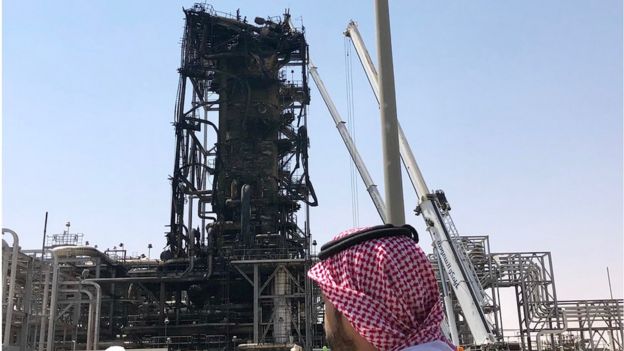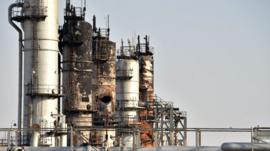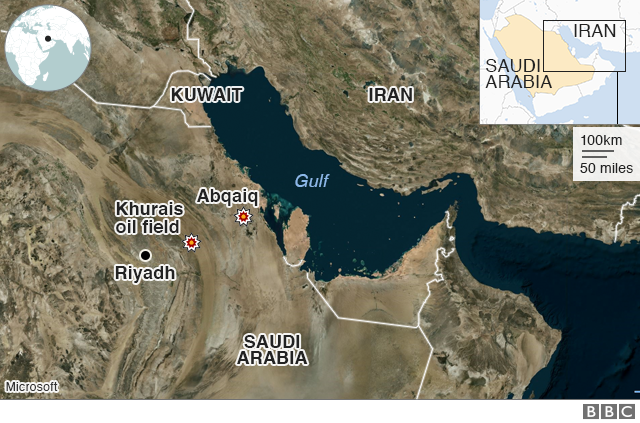The Iranian Terrorist Theocracy
"The terrorist strikes were still going on when the first team arrived. The first hour [of response] is known as the golden hour and they knew they had to try to get a handle before it burned out of control."
"You can see, there is a lot of damage. But we have some of the best teams in the world Within seven hours the fires were extinguished. Within 24 hours we brought production back to 30 percent."
"Yes, the attack happened. But had it been any other country that would have been it [for the industry]. We must remember that Saudi is strong."
"The world should know that."
Khaled al-Hamdi, operations manager, Abqaiq Aramco oil plant, eastern Saudi Arabia
"The pinpoint precision of the drone strikes is astonishing and the fact that those specific areas were targeted indicates the attackers knew where to strike for maximum effect."
"There are 11 large spheroids, of which it appears at least seven have been struck. If all of these vessels are disabled completely, operations at Abqaiq would have come to a grinding halt."
Former Aramco engineer
 |
| Structures at Khurais bear the signs of the damage inflicted in last Saturday's drone attack (photo: Frank Gardner) |
Middle East rivals; the Shiite Islamic Republic of Iran, an oil-producing state with sinister ambitions including nuclear attainment, control of the Middle East in wrenching authority away from Sunni Saudi Arabia in a region of majority Sunni states, and reaching throughout the world to influence support for its brand of violent Islamist jihad. The targeted hit at the Abqaiq plant was not the only target; simultaneously another pinpoint-accurate attack was taking place 240 kilometres away at another processing site at Khurais, also hit by a combination of missiles and drones.
Saturday was not a good day for the Kingdom. Considerable damage was inflicted on both plants. The shock of the events was stunning; first in the bold and obvious violence that it represented, and second in the amount of damage that ensued, and lastly that the incoming missiles were not detected by the vast array of early warning technology on land and at sea by either Saudi installations or those of the United States. Saudi oil production was, in one fell swoop, crippled. From over five million barrels a day to supply world markets to two million.
First indications through an educated hypothesis that it could only have been Iran that was responsible has not yet elicited sufficient certainty, according to authorities, for an immediate response. And Iranian authorities warn that no response is indicated since they were in no way involved in the operation, and should an attack against their own oil fields be contemplated, it would be taken as a declaration of war. Not that Iran had initiated a war footing by its ongoing violent provocations, but any targeted country feeling the pain of Iran's poisonously corrosive actions seeking to respond would be guilty of war-mongering.

The anti-missile defence systems meant to warn Saudi Arabia of any potential attacks were installed to face in the direction where previous missile attacks had come from -- thus failing to detect a coordinated precision attack on two vulnerable sites -- facing south toward Yemen instead of facing north toward Iran and Iraq, where Tehran is suspected of having routed missiles on a circuitous route around the northern Persian Gulf through Iraqi air space, evading the Saudi radar systems as well as the Americans'.
Riyadh's missile experts are still studying the bits and pieces they retrieved from the attacked sites. To ensure that it is absolutely without doubt that the missiles were the responsibility of Iran. "Three-phase separators" held gaping holes in their spherical construction that separates fluids into gas, oil and water. Replacement parts are being shipped in to the country from the United States and Europe on an emergency basis. Two burnt-out stabilization columns forming part of oil-gas separation units at Khurais are being worked on.
The 1,100 usual Aramco employees that work at the Abqaiq plant in a normal week have been swelled to 6,000 workers, labouring around the clock to remediate the damage incurred by one hostile nation using its latest strategic assault weapons against another, with vicious malice aforethought.

Labels: Iran, Oil Production, Saudi Arabia, Terrorism
0 Comments:
Post a Comment
<< Home